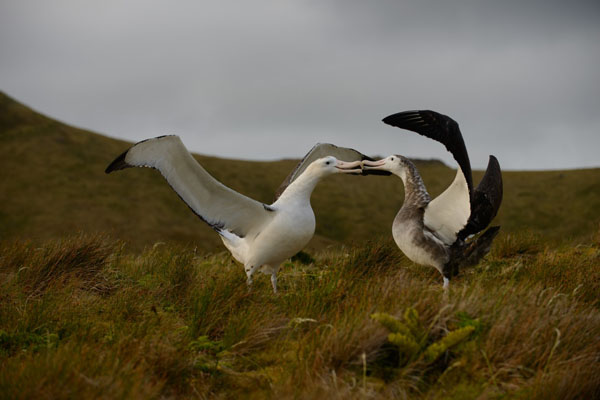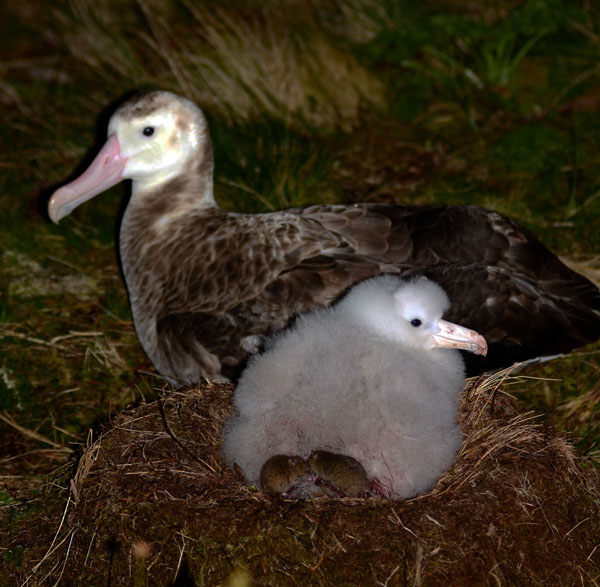Two million seabirds killed annually by mice on Gough Island
Report by Dr Alex Bond,
Senior Curator in Charge, Bird Group, Department of Life Sciences, The Natural History Museum.
Invasive non-native mice on Gough Island are devastating one of the world’s most important
seabird breeding sites, killing the equivalent of four birds a minute.
Without action, the iconic Tristan albatross and the Gough bunting face extinction.
On first look, Gough Island is an idyllic uninhabited British Overseas Territory in the South Atlantic, supporting breeding populations of 22 seabird and two land bird species. The unique flora and fauna of the island earned Gough the status of World Heritage Site in 1995.
But look closer and you’ll see a heart-breaking story unfold.

J Cleeland’s photo shows courting Tristan albatross on Gough Island.
The species has declined by 96% in three generations.
Mice were accidentally introduced to Gough Island in the 19th Century. Now, over 100 years later mice have colonised the entire island, evolving to be 50% larger than the average house mouse and have begun feasting on the eggs and chicks of the island’s once abundant birds.
A new study calculates the impact mice are having on 10 species of defenceless seabirds on Gough Island, and the results are greater than anyone had ever imagined.
The research, supported by the RSPB, found that mouse predation is causing a loss of two million chicks and eggs on Gough Island every year. It might be hard to believe that a 30-gram mouse could kill a 10 kilogram chick, but this environmental catastrophe is very real. These predatory mice are pushing albatross, buntings, petrels and other seabirds towards extinction.
Dr Alex Bond, author of this report said: “We knew there were large numbers of chicks and eggs being eaten each year but the actual number being taken by the mice is just staggering. The seabirds of Gough Island desperately need our help.”
However, help is on the way. The RSPB and Tristan da Cunha government, together with international partners including Island Conservation from the USA and the Department of Environmental Affairs in South Africa, have developed The Gough Island Restoration Programme. Not letting the challenges of working on one of the world’s most remote islands get in the way, the Gough team are planning to eradicate mice from Gough Island in 2020 to stop this carnage once and for all.
If successful, this one action will save two million seabirds each and every year afterwards.
John Kelly, Programme Manager of The Gough Island Restoration, said: “The RSPB and Tristan da Cunha Island Council have developed an ambitious plan to save the Tristan albatross and other species on Gough. The results of this study are a powerful reminder of why we’ve taken this challenge on, restoring the island to a more natural state will prevent the deaths of millions of seabirds. But we cannot do this alone. We are asking all those with a love of nature to come together to save these precious species.”
Two million seabirds killed annually by invasive mice on British Island
Invasive non-native mice on Gough Island are devastating one of the world’s most important seabird breeding sites, killing the equivalent of four birds a minute. Without action, the iconic Tristan albatross and the Gough bunting face extinction.

Ben Dilley’s photo shows mice attacking a Tristan albatross chick.
Up to nine mice at a time have been observed predating on one chick.
